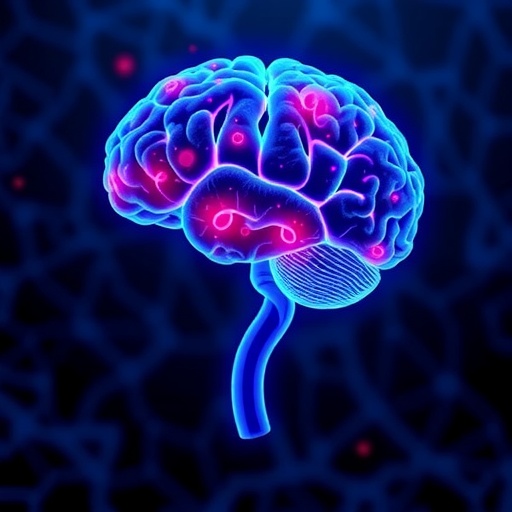In the rapidly evolving landscape of oncology and microbiome research, a groundbreaking study has shed light on the intricate relationship between gastrointestinal dysbiosis and neurological cancer progression through the lens of tryptophan metabolism. This novel investigation, conducted by Kiran, Yashaswini, Chatterjee, and colleagues, uncovers pivotal mechanistic insights that may redefine our understanding of cancer’s metabolic underpinnings and open promising therapeutic avenues targeting the gut-brain axis.
The human gastrointestinal tract hosts a diverse and dynamic microbial ecosystem essential for maintaining metabolic and immune homeostasis. When this delicate microbial balance is disrupted—termed dysbiosis—a cascade of biochemical perturbations may ensue, reverberating beyond the gut environment. The new findings elucidate how such dysbiosis exerts profound consequences on the metabolism of tryptophan, a crucial amino acid known to function as a metabolic precursor for several neuroactive compounds implicated in cancer biology.
Tryptophan metabolism operates predominantly through three pathways: the kynurenine pathway, the serotonin pathway, and the indole pathway facilitated by gut microbiota. Dysregulation within any of these routes can alter the local and systemic concentration of metabolites, which in turn impact neuronal function and immune modulation. This study demonstrates that gastrointestinal dysbiosis skews tryptophan catabolism toward immunosuppressive and pro-tumorigenic metabolites, creating an environment conducive to the advancement of neurological malignancies.
Central to this process is the heightened production of kynurenine and its downstream metabolites. These compounds interact with the aryl hydrocarbon receptor (AhR), a transcription factor known to influence tumor microenvironment dynamics and immune escape mechanisms. The research highlights that increased kynurenine levels, fueled by microbial dysbiosis, activate AhR signaling within tumor tissue, promoting cancer cell proliferation and suppressing anti-tumor immune responses.
Emerging evidence from metabolomics analyses within the study reveals that patients with neurological cancers exhibit a distinct metabolite signature characterized by elevated kynurenine and reduced serotonin levels. This metabolic fingerprint correlates with poorer clinical outcomes and aggressive tumor phenotypes. The capacity of gut microbiota to modulate tryptophan availability by degrading it into indole derivatives further nuances this metabolic interplay, as these indoles can possess either protective or deleterious effects on neuronal tissues, contingent upon the microbial composition.
Notably, the researchers employed germ-free mouse models combined with fecal microbiota transplants to demonstrate causality. Mice colonized with dysbiotic microbiota exhibited significantly enhanced tryptophan catabolism along the kynurenine axis, accompanied by accelerated intracranial tumor growth compared to controls. These in vivo findings corroborate clinical observations and underscore the pivotal role of the gut microbiome in dictating the metabolic milieu influencing neurological cancer progression.
Beyond tumor biology, the immune landscape appears to be intricately shaped by dysbiosis-linked tryptophan metabolism. The study delineates how aberrant metabolite accumulation promotes the differentiation of regulatory T cells and myeloid-derived suppressor cells within the tumor microenvironment, dampening anti-tumor immunity. This immunosuppressive shift contributes to cancer cells evading immune surveillance, thereby enhancing malignancy aggressiveness.
From a therapeutic standpoint, targeting tryptophan metabolic pathways represents a compelling strategy. The research explores pharmacological inhibition of indoleamine 2,3-dioxygenase (IDO), the rate-limiting enzyme in the kynurenine pathway, demonstrating attenuation of tumor growth and partial restoration of immune function in preclinical models. The combination of microbiome modulation—through dietary interventions, probiotics, or fecal microbiota transplantation—with IDO inhibitors could synergistically disrupt the pro-tumorigenic metabolic network.
This study also raises critical questions regarding how external factors such as diet, antibiotics, and lifestyle influence the gut microbial balance and, by extension, neurological cancer risk and progression. Given tryptophan’s essential role as a dietary amino acid, its metabolism links environmental inputs with intrinsic cancer biology, providing a unique intersection for preventive and personalized medicine.
The intricate interplay between gastrointestinal dysbiosis, tryptophan metabolism, and neurological malignancies evidently represents a paradigm shift in oncology. This work transcends traditional tumor-centric perspectives, illuminating the systemic and microbial contributions shaping tumor biology. It challenges researchers to expand their investigative horizons to include host-microbe metabolic interactions as core components of cancer pathogenesis.
The implications for patient management and therapeutic innovation are profound. The prospect of non-invasive biomarkers based on microbial and metabolic profiling holds promise for early diagnosis and monitoring therapeutic responses. Moreover, fine-tuning the gut microbiota to recalibrate tryptophan metabolism could become an adjunctive strategy complementing surgery, chemotherapy, and immunotherapy in tackling refractory brain tumors.
As this study paves the way for future clinical trials, it also highlights the need for integrated, multidisciplinary approaches leveraging microbiology, neuro-oncology, immunology, and metabolomics. Understanding the causal chains linking microbiome perturbations, metabolic shifts, and tumor evolution will be critical for developing holistic cancer treatments that harness the body’s own microbial partners.
In summary, the work by Kiran and colleagues transcends conventional boundaries by unraveling how gastrointestinal dysbiosis disrupts tryptophan metabolism, thereby influencing neurological cancer progression. Through sophisticated experimental models and clinical correlations, they reveal a microbial-metabolic axis that shapes the tumor microenvironment and immune landscape. This research not only deepens our comprehension of cancer’s multifaceted nature but also positions the gut microbiome as a tangible target for innovative and precision oncology strategies aimed at improving patient outcomes worldwide.
Subject of Research: Impact of gastrointestinal dysbiosis on tryptophan metabolism and neurological cancer progression
Article Title: Impact of gastrointestinal dysbiosis on tryptophan metabolism and neurological cancer progression
Article References:
Kiran, N.S., Yashaswini, C., Chatterjee, A. et al. Impact of gastrointestinal dysbiosis on tryptophan metabolism and neurological cancer progression. Med Oncol 42, 412 (2025). https://doi.org/10.1007/s12032-025-02972-2
Image Credits: AI Generated




